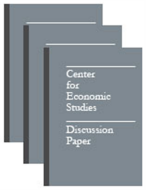Output Market Power and Spatial Misallocation
Output Market Power and Spatial Misallocation
Abstract
Most product industries are local. In the U.S., firms selling goods and services to local consumers account for half of total sales and generate more than sixty percent of the nation’s jobs. Competition in these industries occurs in local product markets: cities. I propose a theory of such competition in which firms have output market power. Spatial differences in local competition arise endogenously due to the spatial sorting of heterogeneous firms. The ability to charge higher markups induces more productive firms to overvalue locating in larger cities, leading to a misallocation of firms across space. The optimal policy incentivizes productive firms to relocate to smaller cities, providing a rationale for commonly used place-based policies. I use U.S. Census establishment-level data to estimate markups and to structurally estimate the model. I document a significant heterogeneity in markups for local industries across U.S. cities. Cities in the top decile of the city-size distribution have a fifty percent lower markup than cities in the bottom decile. I use the estimated model to quantify the general equilibrium effects of place-based policies. Policies that remove markups and relocate firms to smaller cities yield sizable aggregate welfare gains.
Others in Series
Working Paper
Working Paper
Working Paper




